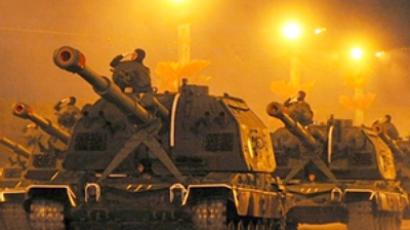Belarus’ irreplaceable president still in office after 15 years
On Friday Belarusian leader Aleksandr Lukashenko, who is often referred to as “Europe's last dictator”, celebrates 15 years since he won his first election, and it appears he is unlikely to leave any time soon.
“After 15 years in power I hardly have a single part in me that isn’t rattling a little – but I just grit my teeth and get on with pulling the load that’s my responsibility. The most important thing, you know, is that I can be adaptable and can adjust and change,” the Belarusian leader recently told Russian daily Izvestiya.
Indeed he can, as for the past decade Lukashenko has had several faces, believes opposition leader Stanislav Shushkevich, who says the president’s “rhetoric changes depending on the circumstances.”
Shushkevich was once the Belarusian leader and joined the opposition after Lukashenko was elected to power in 1994. In 1996 he extended the presidential term to five years and reset the clock of that term back to zero, allowing him even more time in office.
Two years before his second term expired, Lukashenko successful held a referendum that enabled candidates to run for an unlimited number of terms.
For Europe and the US that was one term too many and later they imposed sanctions. Washington labeled Minsk an “outpost of tyranny”, though Russia remained both a political and economic ally.
“The thing is that Belarus gets half of its budget from Russia due to Russia’s readiness to import its agricultural products and subsidize its energy,” explains political analyst Kirill Kostysh.
Today, however, it appears that Moscow and Minsk are falling out. At first they were rowing over gas prices, and then Russia imposed a ban on milk products from Belarus.
“Initially it was a pure business matter, but Lukashenko chose to bring it to a political level,” said Vladimir Zharikhin from the Institute of CIS countries.
Lukashenko accused Russia of blackmailing his country into recognizing Abkhazia and South Ossetia as independent states, which Moscow firmly denies.
Russia’s finance minister scolded Minsk for squandering some of the three billion dollars it had been lent by Moscow.
Just like bad milk, relations with Russia have soured, so now Lukashenko has started courting the West.
The EU has already lifted some sanctions against Belarus, which included travel bans on Lukashenko and senior officials. Lukashenko hopes too that Washington might become amiable again.
The country's opposition now fears that the new “kiss and make-up” with the hard man of Eastern Europe might see the West turning a blind eye to alleged violations of human rights.
“The EU is not consistent in its assessment of Belarus. They say he released political prisoners. Yes he did let free some, but locked up others,” Shushkevich said.
He was once called Europe’s last dictator and the European Castro. Now, many say Lukashenko might become the West’s new best friend – as long as he stays on the wrong side of Russia













